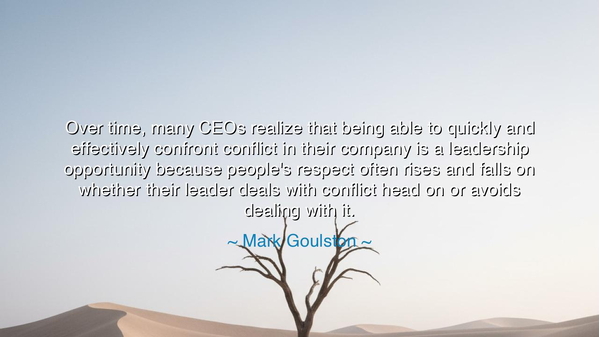
Over time, many CEOs realize that being able to quickly and
Over time, many CEOs realize that being able to quickly and effectively confront conflict in their company is a leadership opportunity because people's respect often rises and falls on whether their leader deals with conflict head on or avoids dealing with it.






Hear the words of Mark Goulston, who declared with the clarity of experience: “Over time, many CEOs realize that being able to quickly and effectively confront conflict in their company is a leadership opportunity because people's respect often rises and falls on whether their leader deals with conflict head on or avoids dealing with it.” Though spoken in the language of the marketplace, this truth resounds with the wisdom of the ancients: that the measure of a leader is revealed not in days of calm, but in hours of conflict. For storms will come to every kingdom, every army, every company, and in those storms the eyes of the people turn to their leader.
What is conflict, if not the fire that tests the strength of the vessel? It exposes weakness, burns away illusion, and forces truth into the open. Many leaders shrink before it, hiding behind silence or delay. But Goulston reminds us that to confront conflict head on is not only a duty—it is an opportunity. In that moment, the leader shows whether they are a shield for their people or a shadow upon them. And the hearts of the people, whether they rise in loyalty or fall into disillusion, are bound to what they witness in that hour.
Consider the tale of Abraham Lincoln during the dark days of the American Civil War. His cabinet was divided, his generals often at odds, and the nation itself torn apart. Yet Lincoln did not flee from the conflict—he met it with patience, firmness, and a spirit of reconciliation. He confronted quarrels among his advisers directly, often with humility and humor, yet always with unwavering resolve toward the greater goal of preserving the Union. It was his courage to face conflict that won him not only victories in war, but the enduring respect of history.
Contrast this with the fall of King Louis XVI of France. Faced with unrest, debt, and revolution, he hesitated, delayed, and avoided the rising conflict within his realm. His failure to act decisively, to confront the grievances of his people and the struggles of his court, eroded their respect and fueled their fury. What might have been resolved with courage in its infancy grew into a firestorm that consumed the throne and the king himself. His fate stands as a warning: avoidance of conflict is not peace—it is the seed of ruin.
The wisdom of Goulston’s words is therefore plain: leadership is forged in conflict. To confront it is to demonstrate strength, justice, and care; to flee it is to reveal fear, weakness, or indifference. People respect not the leader who never encounters storms—for such leaders do not exist—but the one who does not flinch when storms rage. Respect is not given lightly; it is earned in those moments when the leader steps forward while others step back.
The lesson for us is eternal: whether you lead a company, a household, or even your own life, you must not avoid conflict when truth and justice demand that it be faced. Do not mistake silence for peace. Do not allow fear of displeasing others to bind your tongue or still your hand. Speak with honesty, act with fairness, and confront with courage. In doing so, you will earn the respect that outlasts applause, the trust that endures beyond fear.
Practical actions must follow. If conflict arises, approach it quickly, before bitterness festers. Listen with patience, for often conflict hides deeper wounds. Speak with clarity, avoiding the poison of half-truths. Seek resolution, not victory, for the purpose of confronting conflict is not to destroy, but to heal and to guide. And when you have acted, stand firm, knowing that your people will remember not only what you said, but the courage with which you stood.
Thus, let Goulston’s words be inscribed upon the hearts of all who would lead: confront conflict head on, for in doing so you transform trial into opportunity, and win the respect that no title alone can bestow. For leadership is not the absence of storms, but the ability to guide others through them. And in this lies the greatness of all who dare to lead.






AAdministratorAdministrator
Welcome, honored guests. Please leave a comment, we will respond soon